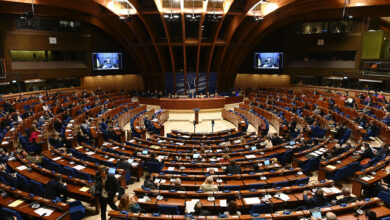A group of independent human rights organizations issued a report on Egyptian human rights violations only a couple days before a scheduled meeting of the United Nations Human Rights Council (UNHRC).
The Forum of Independent Human Rights Organizations (FIHRO) includes 16 institutions that issued a report on Egypt’s human rights record over the past one hundred days. “The Egyptian government claims that it converses with independent human rights organizations…but in reality the government exploits these organizations to get them to approve the government’s performance without accepting their recommendations,” read the forum’s report.
The FIHRO referred to the challenges facing human rights organizations in Egypt. “Egypt is backed by many Arab, African and Non-Aligned Movement states in the UNHRC… which makes it harder to pressure for real rights reform,” said Moataz el-Fegiery, executive director of the Cairo Institute for Human Rights Studies.
The rights report pointed to the May amendment of Egypt’s 29-year-old emergency law–which ostensibly limited its scope to cases of terrorism and drug dealing–saying it “was used against activists and bloggers for peaceful acts unrelated to terrorism or drug trafficking.”
“The government’s performance over the past 100 days showed no respect for the council’s recommendations and violated human rights on various levels,” said Magdy Abdel Hamid, head of the Egyptian Association for the Advancement of Community Participation. “The past hundred days have seen many personal rights breached. Mosaad Abu Fagr, Hani Nazir and Tarek Khedr are still in jail under the emergency law, despite the fact that they’re neither terrorists nor drug dealers.”
Abu Fagr is an activist from the Sinai Peninsula and founder of “We Want to Live,” a movement that advocates for Bedouin rights. He was detained last December under the emergency law and never let go despite some 20 court orders for his release.
Hani Nazir is a Christian blogger detained in 2008 for links he posted on his blog. Nazir “was assaulted several times in jail, and there were attempts to pressure him to convert to Islam,” reads the 39-page forum report.
Tarek Khedr is a student detained last March in front of Alexandria University for agitating for political reform through the recently-formed National Association for Change.
The 100-day chronicle recorded violations against the right to free elections, using examples from recent Shura Council races in which numerous candidates–mostly those of the Muslim Brotherhood–were not allowed to run as independent candidates. Similarly, independents are not allowed to run for the presidency in Egypt.
The report also referred to cases of torture and poor prison conditions that led to the death of prisoners over the period in question. The final part of the report dealt with the lack of women’s rights and freedom of belief.
Representatives of the forum plan to participate in an 11 June UNHRC meeting in Geneva. “We have around six minutes to inform the council on the violations included in our report,” Rawda Ahmed, lawyer for the Arabic Network for Human Rights Information, told Al-Masry Al-Youm.
She went on to express hope that the limited time given for non-governmental organizations would be enough to effectively convey the human rights situation in Egypt.
In February 2010, the council discussed the Egyptian file, presenting 165 recommendations of which Egypt accepted 119, postponed 25 and rejected the rest. The report will be presented at the UNHRC’s Friday discussion on the 25 recommendations discussion of which Egypt has indefinitely postponed.
Egypt




